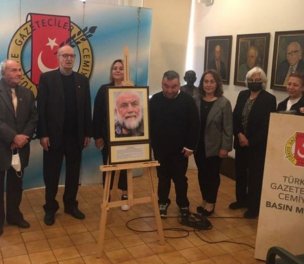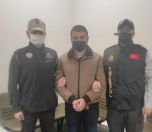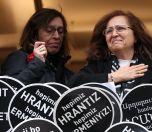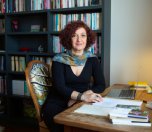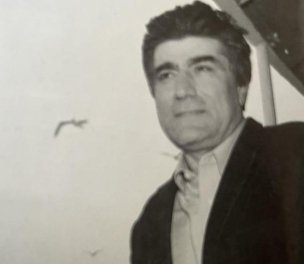Photo: bianet
Click to read the article in Turkish / Kurdish
Hundreds of people have gathered in Şişli, İstanbul to commemorate Hrant Dink on the 15th anniversary of his killing.
As every year, people gathered on the spot where Dink was shot, in front of the Sebat Apartments, the building formerly housed the Agos newspaper's office on Halaskargazi Street.
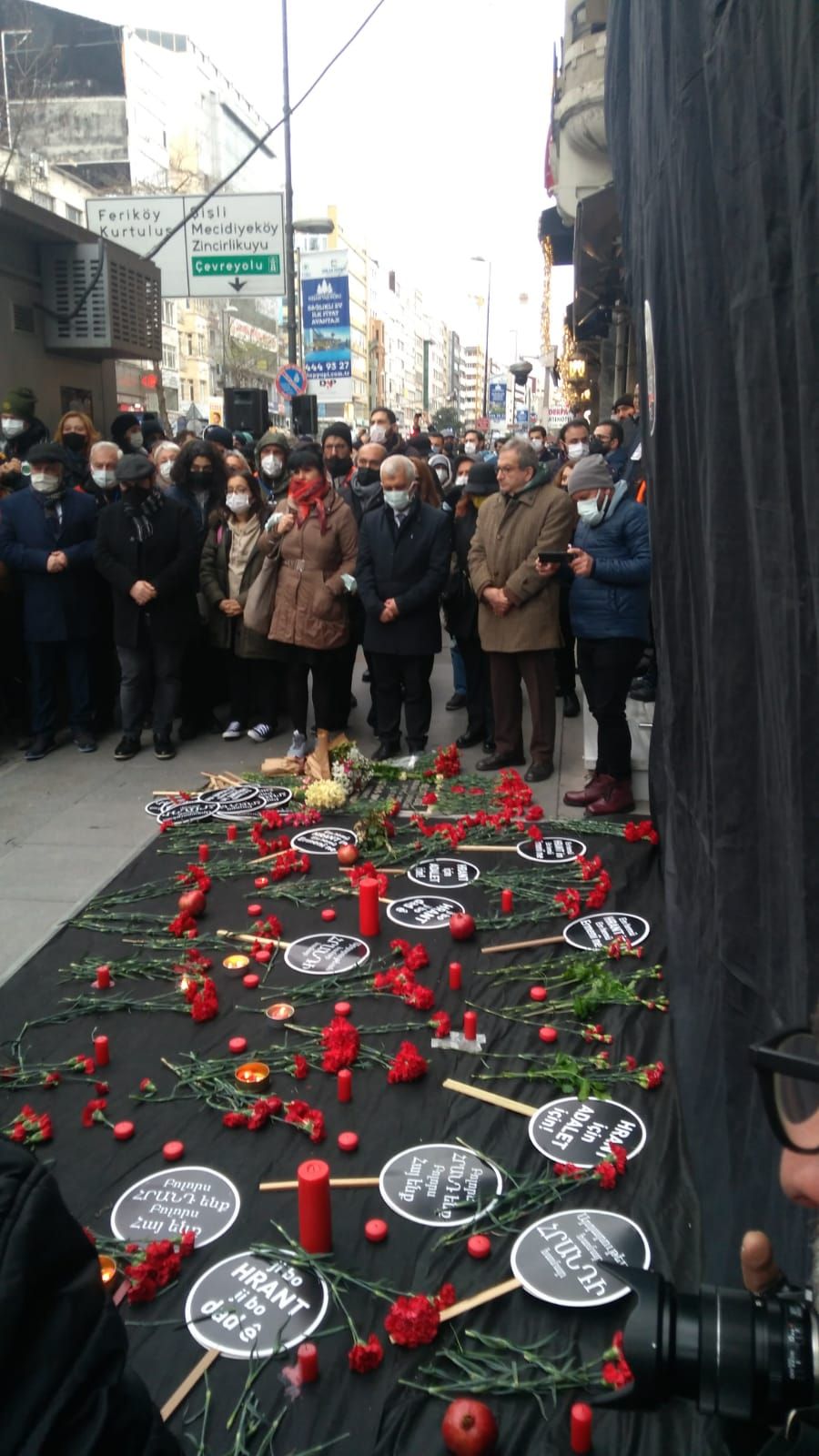
A big portrait of Dink with the inscription "15 incomplete years" was hung on the building.
People lit candles and laid carnations on the spot where Dink was shot. Songs in Turkish and Armenian were played.
Speaking at the balcony of the building, Bülent Aydın, one of the Friends of Hrant, said, "This case won't be over until the real murderers of Hrant receive the punishment they deserve."
"We have friends who can't be together with us today," he said, referring to Bircan Yorulmaz and Osman Kavala, who are in prison.
"We know that Kavala is following us. He is together with us with his heart from Silivri, where he is unjustly held.
"Bircan is one of our friends who has been addressing you from this balcony for 15 years. For the first time in 15 years, she is not together with us."
Emel Kurma read out a letter that Bircan Yorulmaz sent from the prison.
"Today, justice, truth and conscience are mentioned with his name. In the 15 years without Hrant, democracy, peace, freedom, human rights, law, justice and freedom of the press have declined more than ever before in our country," says the letter.
"Prisons are filled with intellectuals, writers, journalists, human rights defenders and elected politicians who struggle for these ideals. Those who try to wage this struggle outside are in constant danger of being deprived of their freedom.
"But we, as the Friends of Hrant, will continue to fight for democracy, peace and freedom from where he left off, wherever we are."

Speaking after the letter was read out, Aydın mentioned Selahattin Demirtaş, a prominent Kurdish politician who has been in prison for more than five years.
"Once again, we greet our friends, deputies, mayors, writers and journalists, who have been deprived of their freedom and arrested for political reasons, from this place. Greetings to Selahattin Demirtaş, one of the people of this place."
"I promised, I won't forget"
After Aydın, Nazım Özgün, a university student who was five years old when Dink was killed, took the floor.
"When I was diagnosed with autism, [Dink] told my mother, 'Never give up on this child. His material is different, his soul is different. I wish uncle Hrant could have seen me enrolled at Hacettepe [University].
"Some stones have tongues. They speak to those who know how to hear them, like uncle Hrant's stone. For me, the stone in front of Agos is much more than the stone uncle Hrant fell on after he was shot. I'm here for the 15th time in 15 years. I promised: I won't forget, I won't give up."
Rakel Dink: Let the painful souls be free
Rakel Dink, the spouse of Hrant Dink, burst into tears after speaking.
"It's been 15 years since the treacherous bullets fired from the back took you away from us. Your voice is still in our ears. They had accused you of back-stabbing whenever you talked about what had been done to your people," said the late journalist's spouse, Rakel Dink.
"O God, you say, 'Love your enemies, do good to those who hate you, pray for those who insult.' I'm praying. Forgive them, they don't know what they are doing."
From the nursery school to Agos, a life-long struggleBorn in Malatya province in September 1954, Agos Editor-in-Chief Hrant Dink was killed in an armed attack on the Şişli Halaskargazi Street, where the newspaper was located, at 3 pm on January 19, 2007. Founded in the year of his passing, the Hrant Dink Foundation shares the following biography of the late journalist in brief: Hrant Dink was born in Malatya on September 15, 1954. He moved to Istanbul with his family when he was five years old. After his mother and father were separated, Hrant Dink and his two brothers went to live at the Gedikpasa Armenian Protestant Church Nursery School. The three brothers all attended Incirdibi Primary school, which was run by the same church, in winter time and lived at the Tuzla Armenian Children's Camp of the school during their summers. Hrant Dink graduated from Bezciyan junior high school and studied at the Surp Hac Tibrevank boarding school before he completed his high school education at Sisli High. He married Rakel Yagbasan, originally from the Armenian Varto tribe from Silopi in the Southeast of Turkey. They had three children. Dink studied zoology and philosophy at Istanbul University's Faculty of Science. He abandoned his dreams of a biological philosophy department at the university at the expense of his active engagement in the developing politics of the left. He was worried that his political engagement could be linked to his Armenian identity and harm the Armenian community living in Turkey, so he changed his name to the Turkish name Firat through the court verdict. Within this period Hrant Dink and his wife Rakel took over the administration of the Tuzla Children's Camp, where they themselves once grew up and began looking after countless Armenian children. The camp underwent difficult times under the accusation of breeding Armenian militants there and was finally confiscated by the State in 1983. Following the closure of the camp, Dink was taken into custody and arrested three times due to his political views. During the 1990s, Hrant Dink ran a bookstore with his brothers in Istanbul. He also started writing for the Armenian daily newspaper, Marmara. He especially wrote reviews of books about Armenian history printed in Turkey under the pseudonym Cutak which means, violin in Armenian. On April 5th 1996, Hrant Dink took part in the foundation of Agos - the first weekly newspaper to be published in Istanbul in both Turkish and Armenian. The word Agos was used in both languages meaning the place where the plough opens a hole in the soil to give the seed in as a source of fertility. As the editor in chief of Agos, Hrant Dink attracted public attention with his rhetoric, which opened new frontiers of debate. He also wrote columns for YeniYüzyıl and BirGün daily newspapers. In 2002 Hrant Dink was sued for a speech he made at a conference in Urfa about identity and citizenship. It was 2006 by the time he was finally acquitted. However, the real intense period of court cases he was subjected to began in February 6, 2004 when an article was published in Agos under his name claiming that Sabiha Gokcen, the step-daughter of Ataturk, the founder of the Turkish Republic, might be of Armenian origin and had relatives in Armenia. In the story, entitled Secret of Sabiha Hatun, Hripsime Sebilciyan, an Armenian from Gaziantep, the Southeast of Turkey, who later took Armenian citizenship, claimed that she was Gökçens niece and Sabiha Gökçen was an Armenian orphan adopted from an orphanage. Despite the supportive report of court experts stating that the newspaper article bore no element of any crime at all, Hrant Dink was still convicted on charges of "publicly insulting and degrading Turkishness'' and sentenced to 6 months in jail by Sisli Criminal Court in Istanbul on October 7, 2005. The verdict was approved by the Ninth Penalty Council of the Supreme Court. When Dink made a statement on the verdict, a new case was filed - this time on charges of attempting to influence the judiciary. During the first hearing of the court case a group of people who demanded to be accepted as an intervening party in the case, protested against Hrant Dink, both outside the court house as well as in the corridors of the building. Hrant Dink had to walk to the courtroom through a line of police, accompanied by his lawyer. As he passed, people tried to attack him, insulted him and spat at him. A group of people who were allowed to enter the courtroom threw coins and pens as well as insulting and threatening the lawyers. After the hearing when Hrant Dink left the court house in a police vehicle, the police had to accompany his lawyers to another police bus which was brought right in front of the courthouse to save them from the fury of the angry crowd. Finally, following another story in Agos entitled 1 vote against 301 published on July 21st, 2006 another court case was opened against Hrant Dink, his son and acting editor of Agos, Arat Dink, and one of the main editors Sarkis Seropyan. The story that was published in Agos and led to this prosecution, quoted a statement that Hrant Dink had previously made to Reuters news agency. Referring to 1915 he had said of course this is a genocide because the result reveals and names the act itself. You see that a nation that was living on this land for four thousand years vanished after what happened. This statement he made to Reuters was later published in many Turkish newspapers as well as Agos. But it was only the editors of Agos who were prosecuted under Article 301 for "insulting Turkishness." This court process continued after Hrant Dink was shot in front of his Office in Agos on January 19, 2007. After the assasination, previous charges against him were dropped. Click here for the full version of the biography |
(HA/VK)




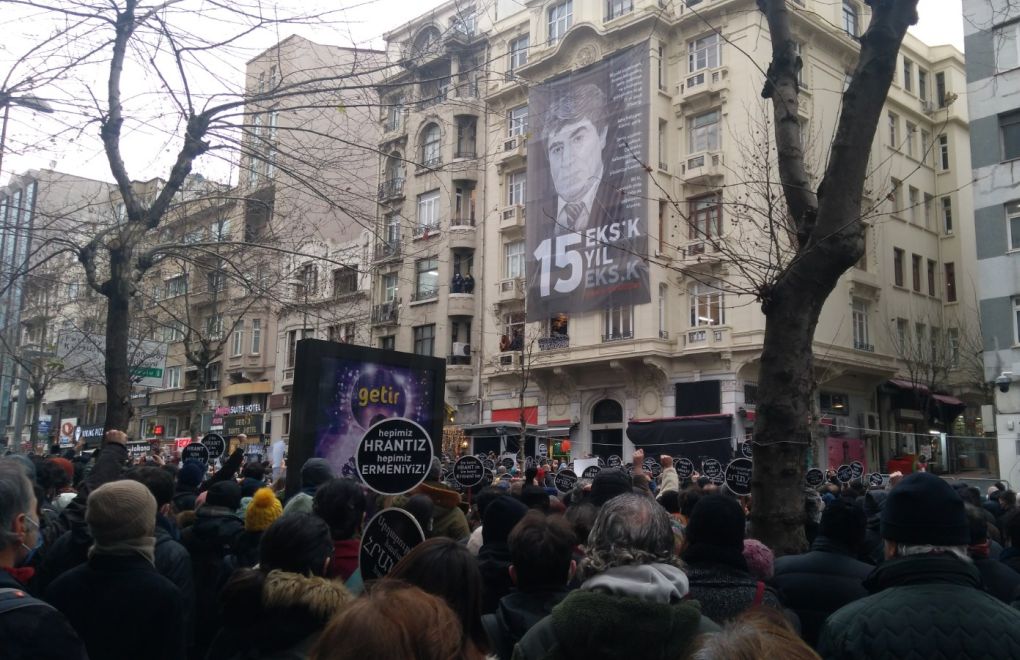
as.jpg)
